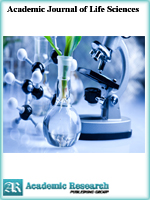Academic Journal of Life Sciences
Online ISSN: 2415-2137
Print ISSN: 2415-5217
Print ISSN: 2415-5217
Quarterly Published (4 Issues Per Year)

Archives
Volume 9 Number 1 June 2024
Some Physico-Chemical Parameters of Plastic Tanks used for Fish Culture in Port Harcourt, Rivers State, Nigeria
Authors: Davies O. A. ; Kpikpi P. B.
Pages: 7-13
DOI: doi.org/10.32861/ajls.91.7.13
Abstract
Physico-chemistry quality is one of the most important factors besides good feed in plastic culture systems for fish production which varies with location or management amongst other factors. Some physical and chemical parameters in some outdoor plastic tanks used for fish culture in Roone Fish Farm (outdoor farm) and Hallelujah Fish Farms (indoor) in Port Harcourt, Nigeria were studied from October 2018 to September 2019. Some physico- chemical parameters (temperature, pH, electrical conductivity (EC), total dissolved solid (TDS), dissolved oxygen (DO) were measured in-situ while biological oxygen demand (BOD) and total organic carbon (TOC) were analyzed in the laboratory following standard methods. The data obtained were subjected to Tukey’s comparison test. The observed results were: temperature (27.22±1.50 ℃), pH (6.79±0.83), TDS (14±58.10 mg/L), EC (25.25±15.20 µs/cm) and TOC (0.17±0.18 mg/L) (P>0.05). The recorded values for the measured parameters were within the acceptable limits for fish culture except for pH and DO that were below the acceptable limits. The study therefore recommends outdoor plastic tanks for fish production.
Additive Effect of Some Medicinal Plants Extracts Used for the Treatment of Malaria in Sokoto Metropolis, Nigeria
Authors: Ibrahim Sani ; Yusuf Ahmad Binji
Pages: 1-6
DOI: doi.org/10.32861/ajls.91.1.6
Abstract
Malaria remains a threat and exert economic and social burdens in most communities in Africa. Medicinal plants have played an important role in the treatment of malaria worldwide. Several studies have shown that, the efficacies of most antimalarial agents are compromised by the emergence of drug-resistant Plasmodium species. This research was aimed at evaluating the synergistic effect of some medicinal plants used for the treatment of malaria in Sokoto metropolis, Nigeria. Three (3) plants samples were collected and used for the study. They include Azadirachta indica, Carica papaya and Psidium guajava leaves. They were dried and extracted using 50% methanol. Qualitative phytochemical analysis of three (3) plant extracts was carried out using standard methods. The individual extracts and their combinations were subjected to in vivo antiplasmodial activity. Synergistic effect was determined by checkboard method. Phytochemical screening of Azadirachta indica, Carica papaya and Psidium guajava leaves methanol extracts all revealed the presence of phenols, tannins and glycosides in all the extracts. Extract combination of Carica papaya and Psidium guajava demostrated 100% reduction of parasitemia at both 100 and 200 mg/kg b. wt respectively after 72-hour treatment. Determination of synergistic activity showed that Fractional Activity Index (FAI) of Carica papaya and Psidium guajava is greater than 1.0, hence the effect was considered to be additive. The findings of this study had provided scientific bases supporting the traditional use of the plants for the treatment of malaria.



